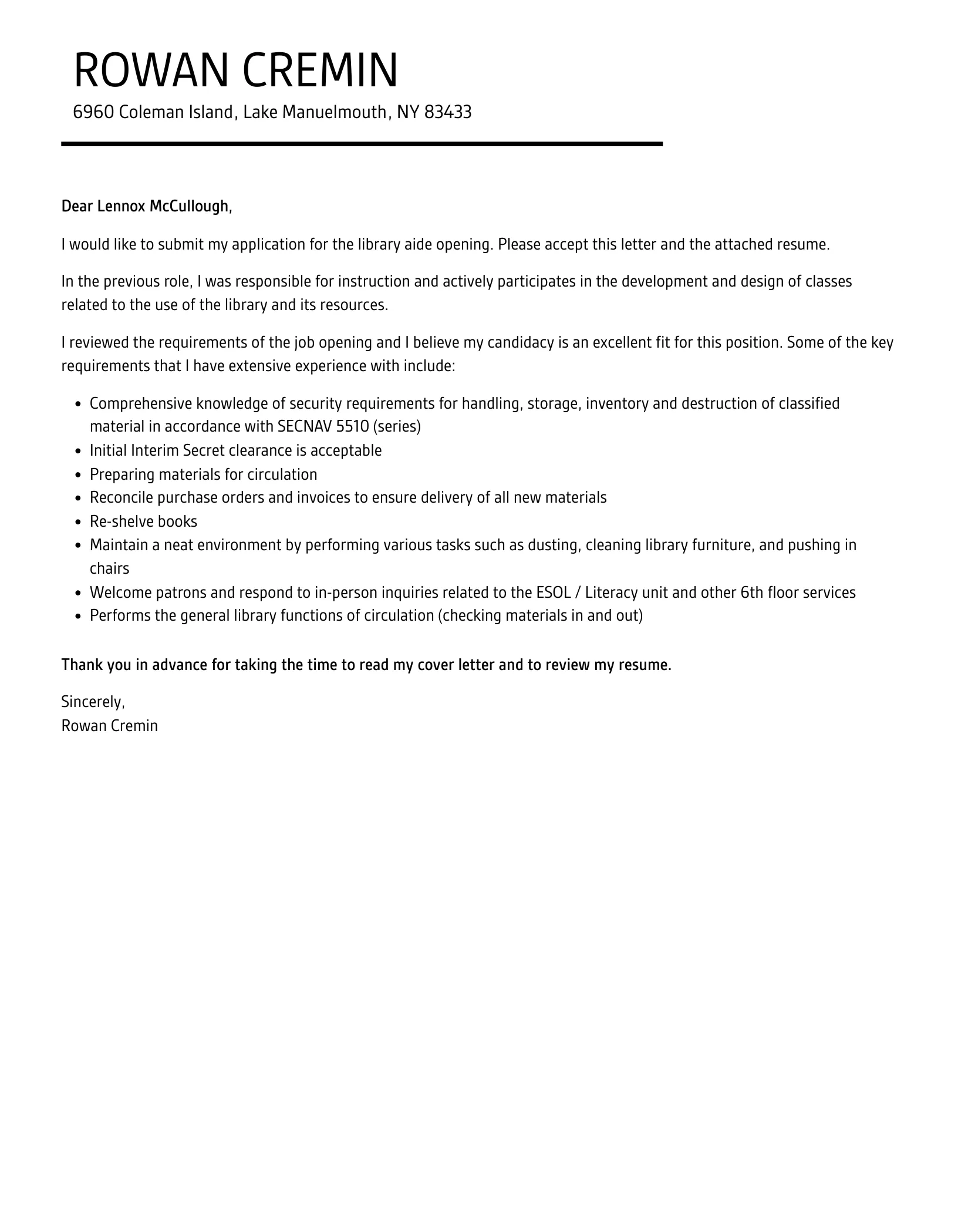Crafting a Winning Library Aide Cover Letter
A well-crafted cover letter is your first introduction to a potential employer, and for a Library Aide position, it’s your chance to showcase your passion for libraries, your relevant skills, and your personality. This guide provides a comprehensive overview of how to create a compelling cover letter that grabs the attention of hiring managers and increases your chances of landing an interview. The goal is not just to list your qualifications, but to tell a story that highlights your suitability for the role and your genuine enthusiasm for working in a library environment. We’ll explore each element, from understanding the role to following up after submission, so you can create a cover letter that stands out from the crowd. Let’s get started on your path to library employment!
Understanding the Role of a Library Aide
Before you begin writing, it’s crucial to understand the responsibilities of a Library Aide. This role typically involves a variety of tasks, including assisting patrons, shelving books, maintaining library organization, processing materials, and assisting with programs and events. Having a clear understanding of these duties will enable you to tailor your cover letter to highlight the skills and experiences most relevant to the position. Research the specific library and the job description provided to tailor your letter to meet the needs and expectations of the hiring manager. Demonstrate that you understand the needs of the role as this shows you are ready and prepared to take on the responsibilities of a Library Aide and are not just applying for any job.
Key Skills to Highlight in Your Cover Letter
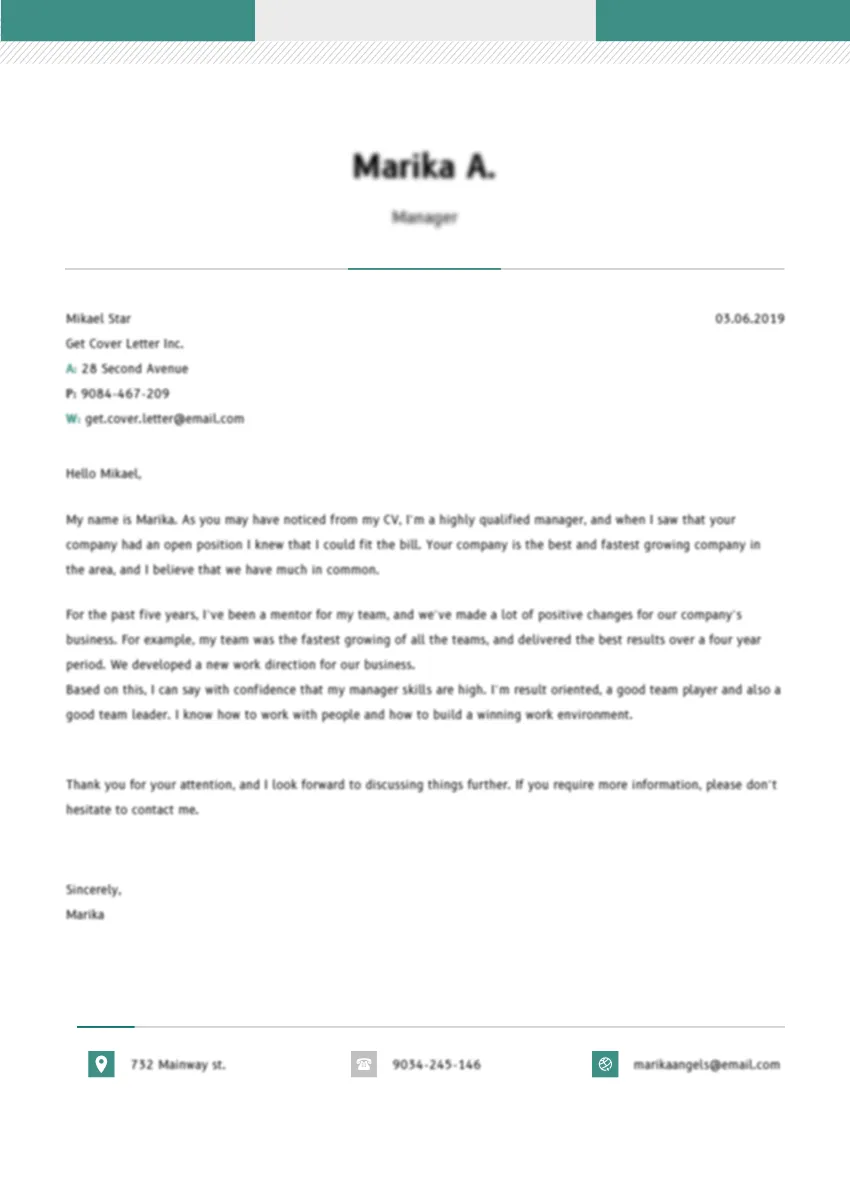
A successful Library Aide possesses a unique combination of skills. When crafting your cover letter, be sure to emphasize these key areas. Consider how your past experiences and skills align with the job description and tailor your letter to match. Highlighting these skills will show the hiring manager that you possess the qualities needed to be a successful Library Aide, from interacting with patrons to assisting with the various tasks to manage and maintain the library.
Customer Service and Communication
Excellent customer service skills are paramount. Library Aides interact with diverse patrons daily, assisting them with inquiries, locating materials, and resolving issues. Highlight any experience you have in customer-facing roles, such as retail, hospitality, or volunteer work, where you demonstrated patience, empathy, and effective communication skills. Be sure to describe how you handled challenging situations, such as addressing a frustrated customer or mediating a disagreement. Mention specific examples of how you went above and beyond to provide excellent customer service. The ability to communicate clearly and respectfully, both verbally and in writing, is crucial for assisting patrons and collaborating with colleagues.
Organizational Abilities and Attention to Detail
Libraries thrive on organization. Library Aides are responsible for shelving books, maintaining order, and assisting with inventory management. Showcase your organizational skills by highlighting experience in tasks such as organizing events, managing files, or maintaining databases. Detail any experience you have with attention to detail, such as proofreading documents, ensuring accuracy, and following procedures precisely. Provide examples of when you had to organize a project or task that resulted in a positive outcome. Libraries need individuals who pay close attention to detail to keep operations running smoothly and ensuring that all items are in the correct places and properly maintained. A good Library Aide has strong attention to detail.
Technological Proficiency
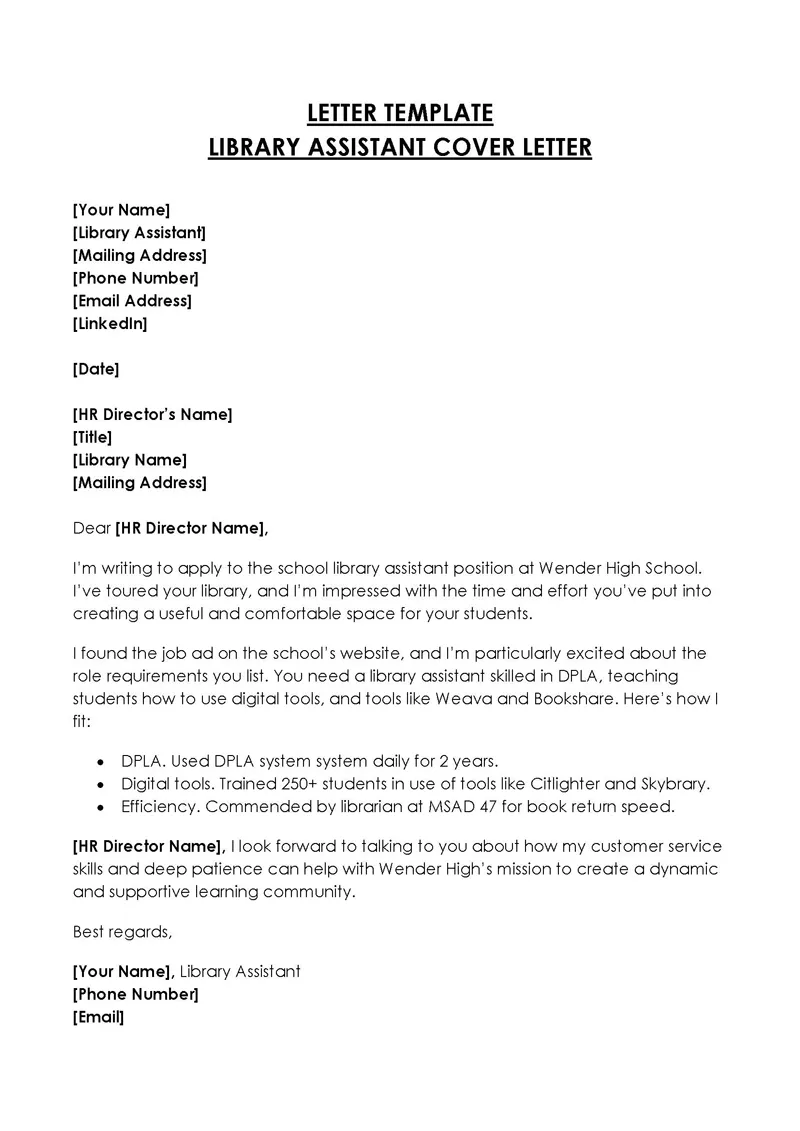
Libraries use technology to manage their collections, databases, and services. Demonstrate your proficiency in using computers, databases, and software. Highlight any experience with library systems, cataloging, or digital resources. The ability to learn new software quickly and troubleshoot basic technical issues is also beneficial. Be sure to mention specific software you are familiar with, such as Microsoft Office, Google Suite, or any library-specific systems. Showcase your comfort level with technology by including any skills like data entry, data management, or providing technical support. Make sure to mention the specific platforms you have experience with to show the hiring manager that you are prepared to quickly pick up new technologies and contribute to the library’s operations.
Tailoring Your Cover Letter
A generic cover letter is easily overlooked. Take the time to tailor your letter to each specific job application. This demonstrates your genuine interest in the position and the library. Customize your cover letter to specifically reflect the requirements and preferences outlined in the job posting. This shows the hiring manager that you’ve taken the time to understand the role and the library’s mission. Customization goes beyond merely changing the library’s name. It includes highlighting specific skills and experiences that align with the job description’s requirements.
Researching the Library and Position
Before you start writing, research the library where you’re applying. Visit their website, social media pages, and, if possible, the library itself. Understanding the library’s mission, values, and services will help you tailor your letter to showcase your alignment with their goals. Examine the job description carefully. Identify the key responsibilities, required skills, and preferred qualifications. This information is crucial for customizing your letter to highlight the most relevant aspects of your experience. Show the hiring manager that you understand the library and what the role requires of you, as this is an essential part of the cover letter process and shows that you are dedicated to the library and the position.
Highlighting Relevant Experience
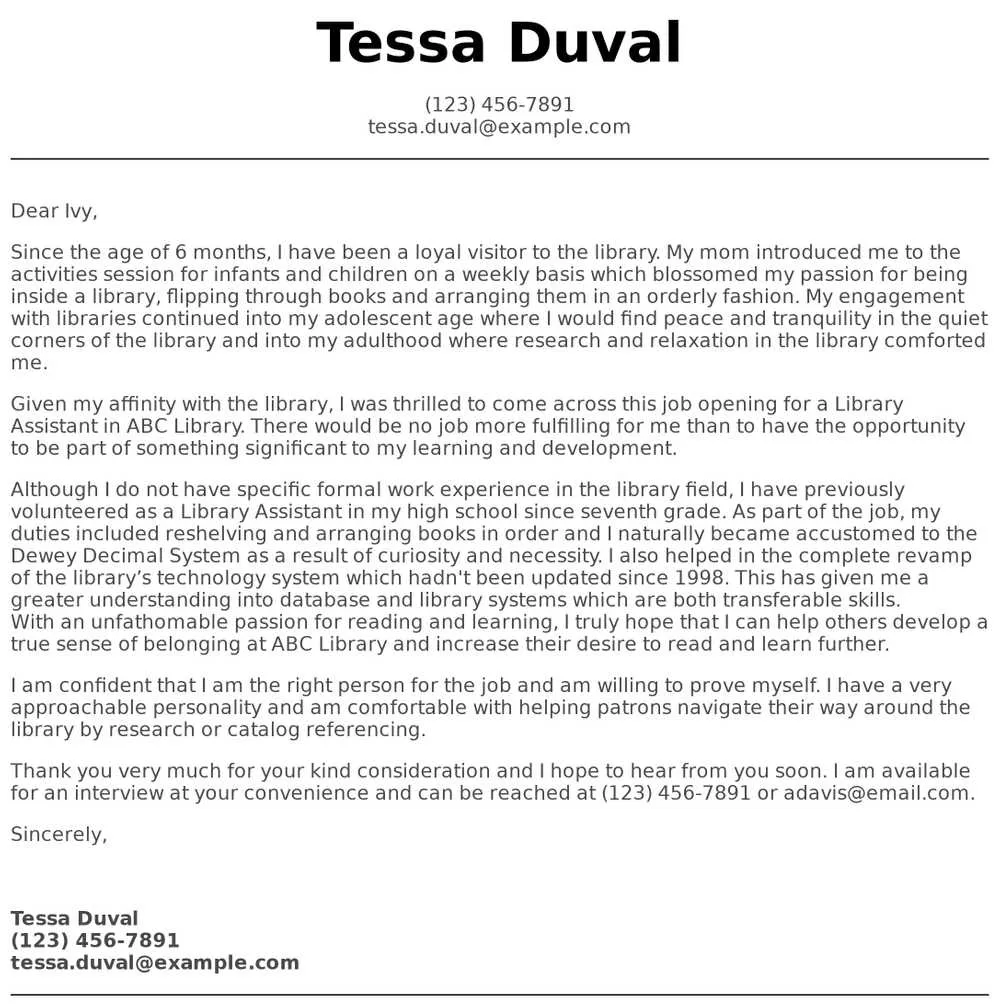
Focus on experiences that demonstrate the skills and qualities sought in a Library Aide. This may include paid employment, volunteer work, internships, or even relevant coursework. Provide specific examples that illustrate your abilities, such as a time you resolved a patron’s issue, organized a project, or used a specific software program. Quantify your achievements whenever possible. For example, instead of saying “assisted patrons,” you could say “assisted an average of 50 patrons per day.” Quantifying your achievements provides concrete evidence of your skills and makes your cover letter more persuasive. Mention any previous experience in a library or similar role, this is a great way to demonstrate that you understand the library setting and what the job entails. Be sure to show how your skills align with the job, and do not just state that you are skilled, but provide examples of how you have previously used those skills.
Formatting Your Cover Letter for Impact
The format and layout of your cover letter contribute to its overall impact. Your cover letter should be easy to read and visually appealing. Use a professional font, such as Times New Roman or Arial, and ensure the font size is easy to read (11 or 12 points). Use clear headings and subheadings to break up your content and guide the reader. Leave ample white space to avoid a cluttered appearance. Use a standard business letter format, including your contact information, the date, the hiring manager’s name (if known), and a professional closing. Be concise, ideally keeping your cover letter to one page. This demonstrates respect for the hiring manager’s time and ensures that your key qualifications are highlighted effectively. Formatting is a key part of making sure the letter is easy to read, so do not underestimate its importance, as an easy-to-read letter will be much more likely to be read and considered.
Essential Elements of a Cover Letter
Every cover letter should include these essential elements to ensure a strong application. These basic parts are crucial to present yourself in a clear and professional manner. These parts will help you showcase your best qualities and convince the hiring manager that you are a suitable candidate for the role.
Contact Information and Salutation
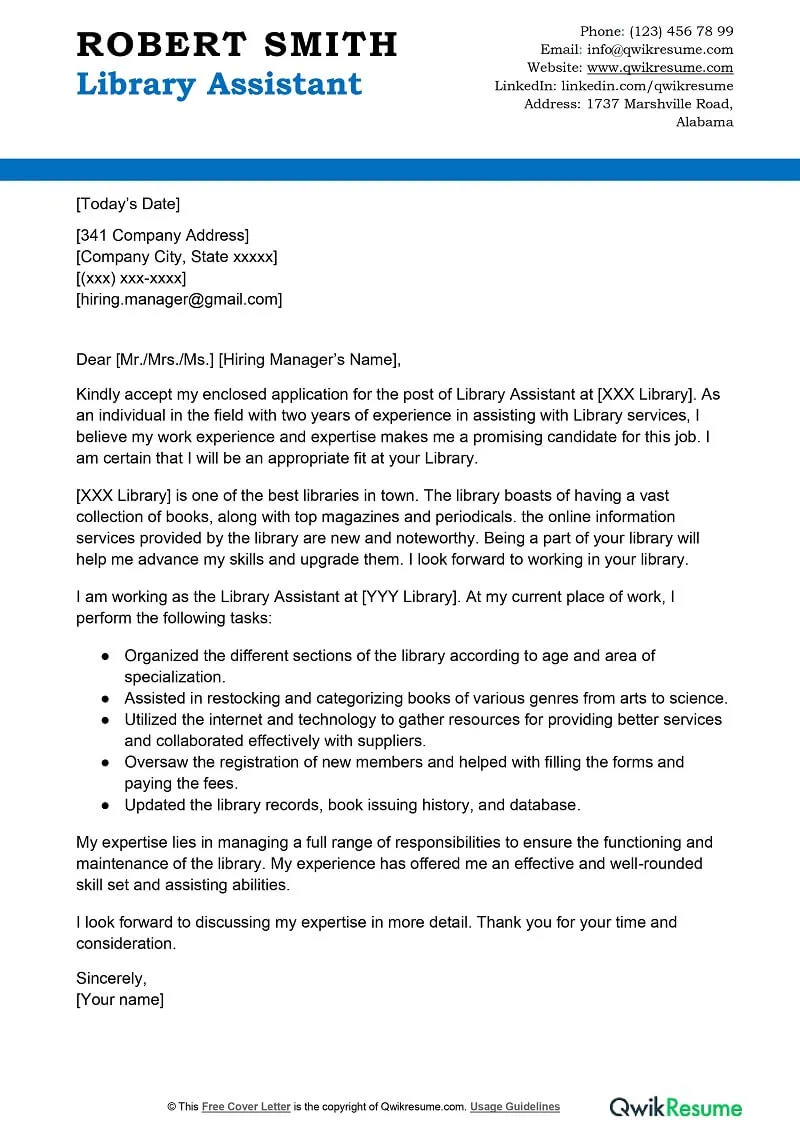
Begin with your full name, address, phone number, and email address at the top of your letter. This allows the hiring manager to easily contact you. If possible, address your letter to the hiring manager by name. Researching the hiring manager’s name shows initiative and attention to detail. If you’re unable to find a specific name, use a professional salutation, such as “Dear Hiring Manager.” This is a great way to start on the right foot and demonstrate your professional etiquette. Be sure to make sure the salutation is professional and addresses the hiring manager appropriately.
Opening Paragraph Crafting
Your opening paragraph is your first chance to grab the reader’s attention. State the position you are applying for and where you saw the job posting. Briefly introduce yourself and highlight your most relevant qualification or experience. Clearly express your enthusiasm for the position and the library. Focus on capturing the reader’s interest and making them want to read more about you. Your opening paragraph sets the tone for the entire letter, and is the first impression the hiring manager will get from your cover letter. Try to make it interesting, while maintaining a professional tone, so the hiring manager continues reading.
Body Paragraphs Skills and Achievements
Use the body paragraphs to expand on your skills, experiences, and achievements. Organize your content logically, using separate paragraphs to address different skills or aspects of your qualifications. Provide specific examples that illustrate your abilities and back up your claims with evidence. Quantify your achievements whenever possible to showcase your contributions. Tailor your content to match the job description and library’s needs. Showcase how your skills and experiences align with the specific requirements outlined in the job posting. Focus on your strongest and most relevant experiences to make the most impact and ensure the hiring manager gets the information they need to make a decision.
Closing with Confidence
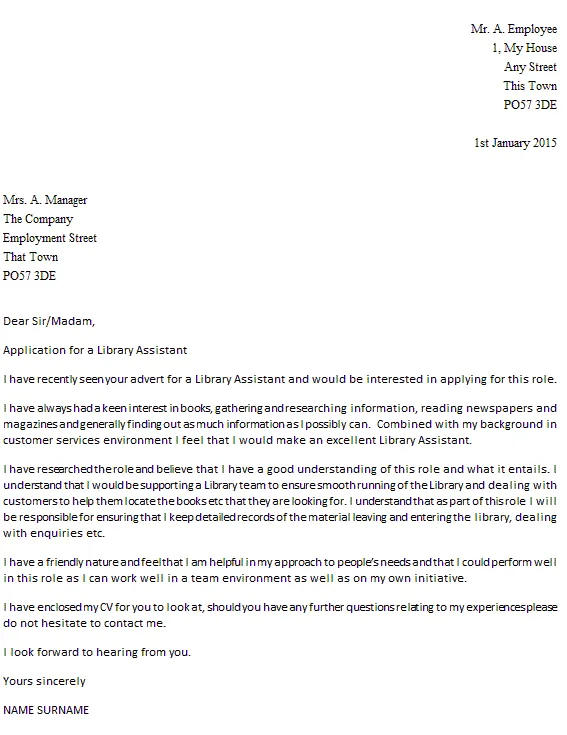
End your letter with a strong closing paragraph. Reiterate your interest in the position and the library. Summarize your key qualifications and emphasize your enthusiasm for the opportunity. Include a call to action, such as “I am eager to discuss my qualifications further and can be reached at…” or “Thank you for your time and consideration. I look forward to hearing from you.” Thank the hiring manager for their time and consideration. Use a professional closing, such as “Sincerely” or “Best regards,” followed by your full name. A strong close will help you leave a good impression with the hiring manager, and it is a crucial part of the process. This can often set you apart from the other candidates.
Proofreading and Editing
Before submitting your cover letter, proofread and edit it meticulously. Errors in grammar, spelling, or punctuation can make a negative impression. Use a grammar checker and spell checker. Read your letter aloud to catch any awkward phrasing or flow issues. Ask a friend, family member, or career counselor to review your letter for feedback. Ensure your cover letter is free of errors and reflects your professionalism. A well-edited cover letter will show the hiring manager that you care about the details and are capable of presenting yourself in a professional manner.
Examples of Effective Cover Letter Phrases
Use strong action verbs and compelling phrases to make your cover letter stand out. Here are a few examples of phrases you can incorporate into your cover letter to enhance its impact. Using the right phrases can help showcase your strengths. These phrases can often show the hiring manager how you will perform in the Library Aide role. Use these as a basis for your cover letter, and tailor your writing to your own experiences. Remember to be yourself and make sure your cover letter reflects who you are as a person.
- “Managed daily patron inquiries with a focus on providing excellent customer service.”
- “Shelved an average of 100 items per shift, maintaining accurate order and organization.”
- “Proficient in using the library’s cataloging system to assist patrons in finding materials.”
- “Assisted in the organization and execution of library programs and events.”
- “Demonstrated a strong attention to detail when processing and cataloging new materials.”
- “Collaborated effectively with colleagues to ensure smooth library operations.”
- “Quickly learned and adapted to new software and technologies used in the library.”
- “Consistently received positive feedback from patrons regarding assistance and helpfulness.”
Showcasing Passion for Libraries
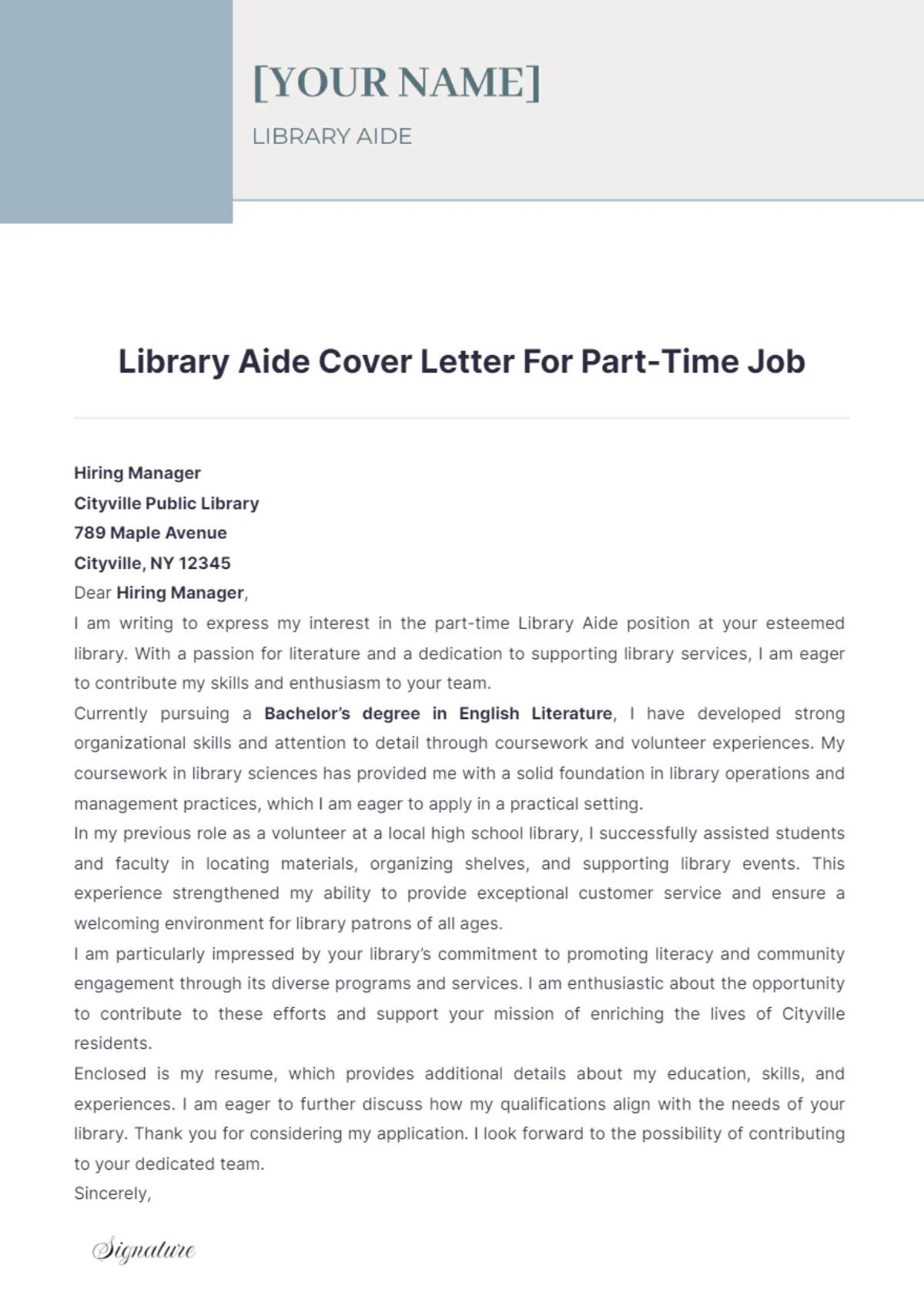
Express your genuine interest in libraries and their role in the community. Share why you’re passionate about libraries and what you find rewarding about working in a library environment. Mention any personal experiences that have fueled your interest in libraries, such as being a frequent library visitor or participating in library programs. Connect your passion to the specific library and its mission. Research the library’s community engagement efforts and highlight how your values align with their mission. By showing your passion for libraries, you will show the hiring manager that you will be invested in the role and that you are a great fit for the role, and more likely to be considered for it.
Demonstrating Initiative and Enthusiasm
Highlight instances where you’ve taken initiative or gone above and beyond. Provide examples of when you’ve taken on additional responsibilities, volunteered for projects, or sought out learning opportunities. Showcase your enthusiasm for the position and the library. Express your eagerness to contribute to the library’s success and your willingness to learn and grow. Show that you are a proactive and enthusiastic individual to the hiring manager. Make it clear you are eager to learn and contribute to the library. Show that you’re more than just a worker, but someone who genuinely wants to be a part of the library and its team.
Following Up After Submission
After submitting your cover letter and resume, follow up with the hiring manager. Send a brief email or make a phone call within a week or two of submitting your application. Reiterate your interest in the position and inquire about the status of your application. Be polite and professional, and express your gratitude for the opportunity. This shows your continued interest in the position and your respect for the hiring process. This also provides a chance to reinforce your interest and professionalism to the hiring manager. Be patient and professional, and it will show that you really want the job and are persistent in your search. This step is another way to set you apart from the rest of the applicants.
By following these guidelines, you can create a winning Library Aide cover letter that showcases your skills, experience, and passion for libraries. Good luck with your job search!
